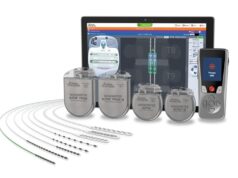 Combination spinal cord stimulation (SCS) therapy with Boston Scientific’s WaveWriter system has demonstrated superior outcomes to conventional medical management (CMM) in chronic pain patients with no prior back surgery, as per randomised controlled trial (RCT) data presented recently at the North American Neuromodulation Society (NANS) annual meeting (12–15 January 2023, Las Vegas, USA).
Combination spinal cord stimulation (SCS) therapy with Boston Scientific’s WaveWriter system has demonstrated superior outcomes to conventional medical management (CMM) in chronic pain patients with no prior back surgery, as per randomised controlled trial (RCT) data presented recently at the North American Neuromodulation Society (NANS) annual meeting (12–15 January 2023, Las Vegas, USA).
During NANS 2023, Boston Scientific showcased some 40 abstracts relaying randomised controlled data and real-world evidence pertaining to the company’s therapies for patients with chronic pain and neurological disorders.
One such abstract was presented by James North (Carolinas Pain Institute and Center for Clinical Research, Winston-Salem, USA), who delivered three-month data from the SOLIS RCT—a multicentre, prospective, parallel-group study evaluating WaveWriter SCS with multiple modalities versus CMM.
The trial involved patients with chronic low back pain and/or leg pain who had not undergone spinal surgery, often referred to ‘virgin back’ or non-surgical back pain (NSBP). A total of 60 patients were enrolled and were ultimately available for the trial’s three-month primary endpoint analysis.
In SOLIS’ experimental treatment arm—which saw multiple mechanisms of action engaged under a single SCS combination therapy—NSBP patients experienced higher responder rates (88% vs 8%) without an increase in opioids, as well as a significant improvement in disability and higher satisfaction rates, at three months.
As such, the trial was determined to have met its primary endpoint, which was the proportion of subjects with a ≥50% reduction in average, overall pain with no increase in baseline opioid medications in the experimental (SCS plus CMM) arm versus the control (CMM only) arm.
With the SOLIS trial also meeting its prespecified secondary endpoints across a 60-patient cohort—improvement in disability on the Oswestry Disability Index (ODI) and patient satisfaction rates as per the Patient Global Impression of Change (PGIC) scale—the investigators concluded that SCS with multiple modalities is effective in treating chronic pain, demonstrating superior outcomes to CMM alone in patients with no prior back surgery.
In addition, North reported that these SOLIS RCT outcomes are consistent with long-term, real-world NSBP data from the global, prospective RELIEF registry, which are now published in Pain Management, and two-year results from the COMBO RCT, which were delivered at last year’s NANS meeting.













